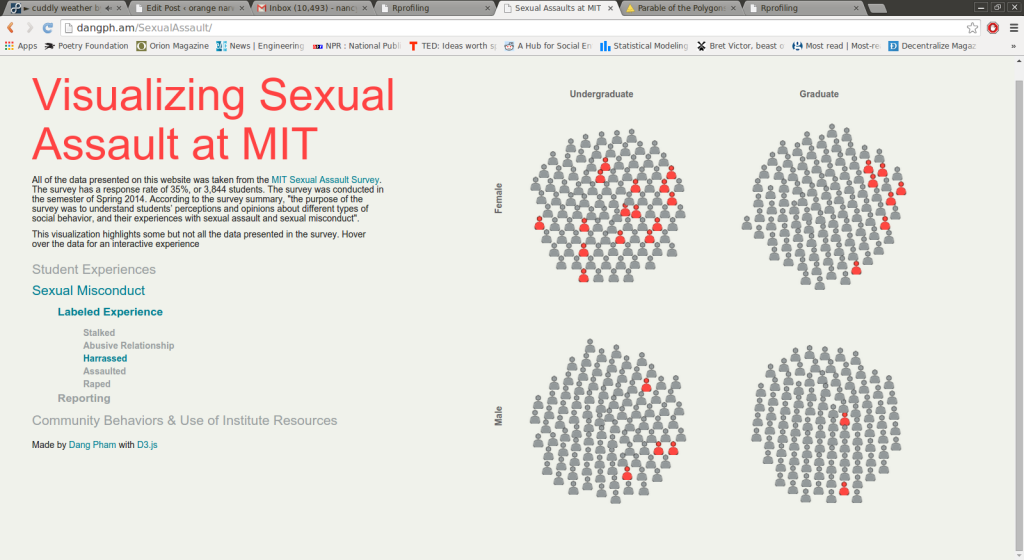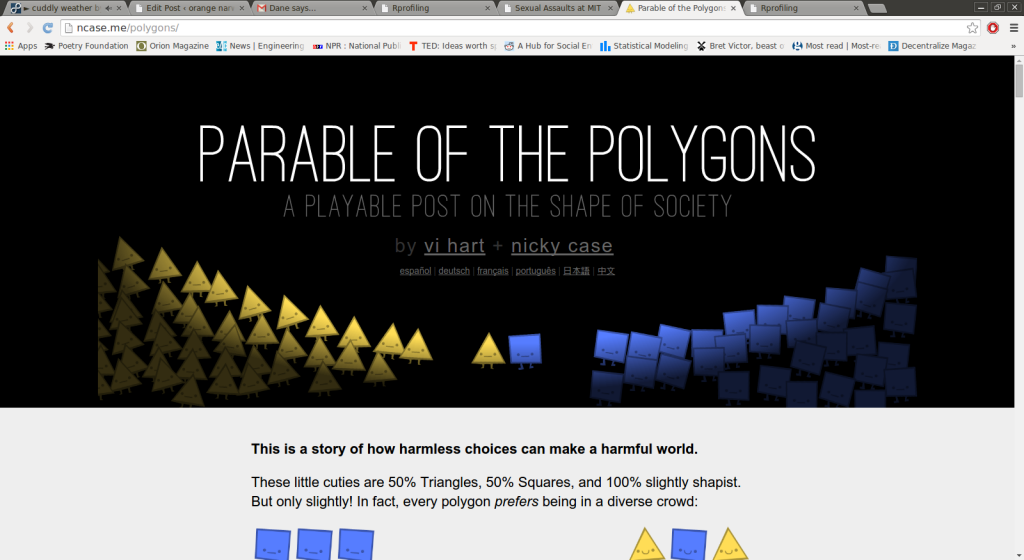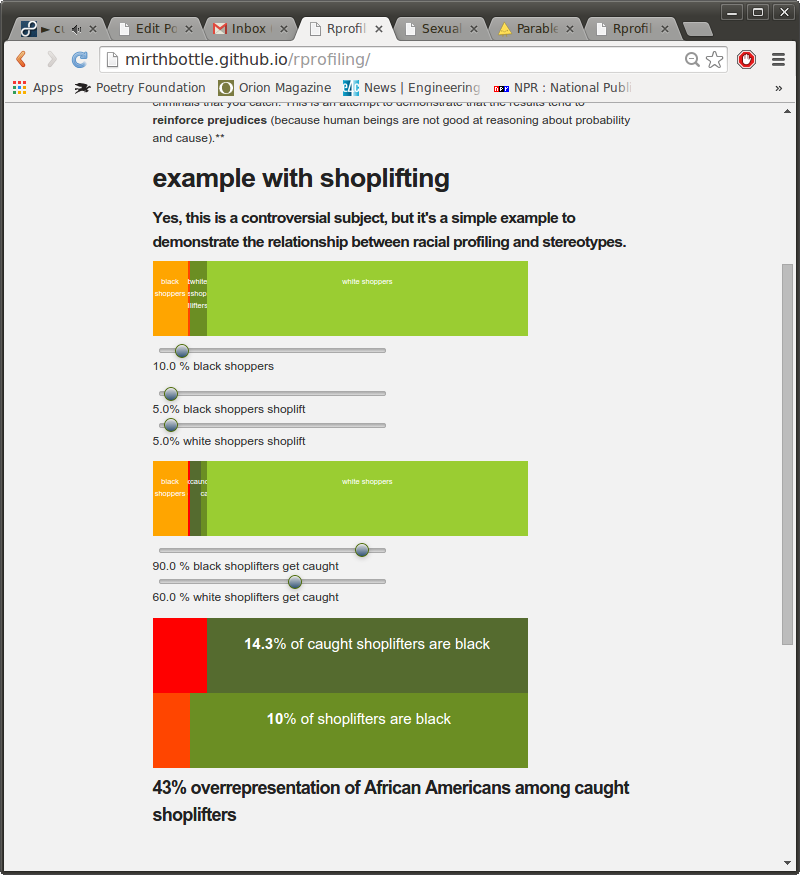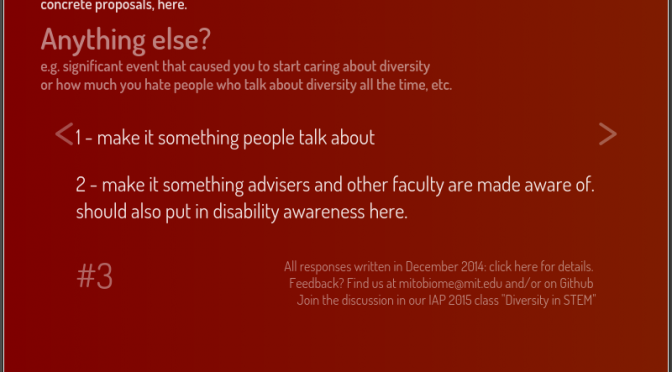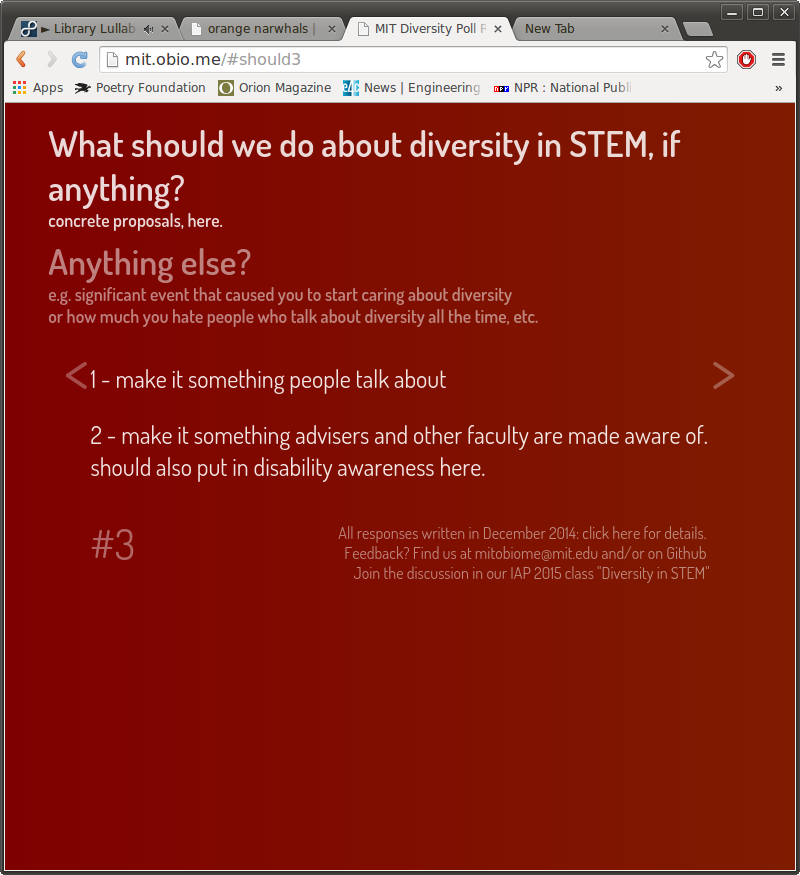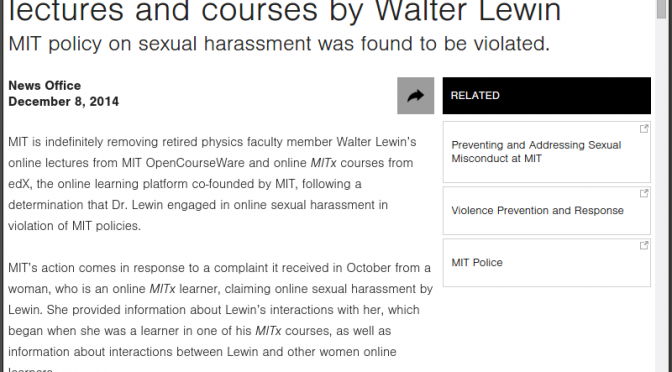Reading the comments on the Tech article re: Lewin being stripped of professor emeritus status and having all his online MIT materials taken down
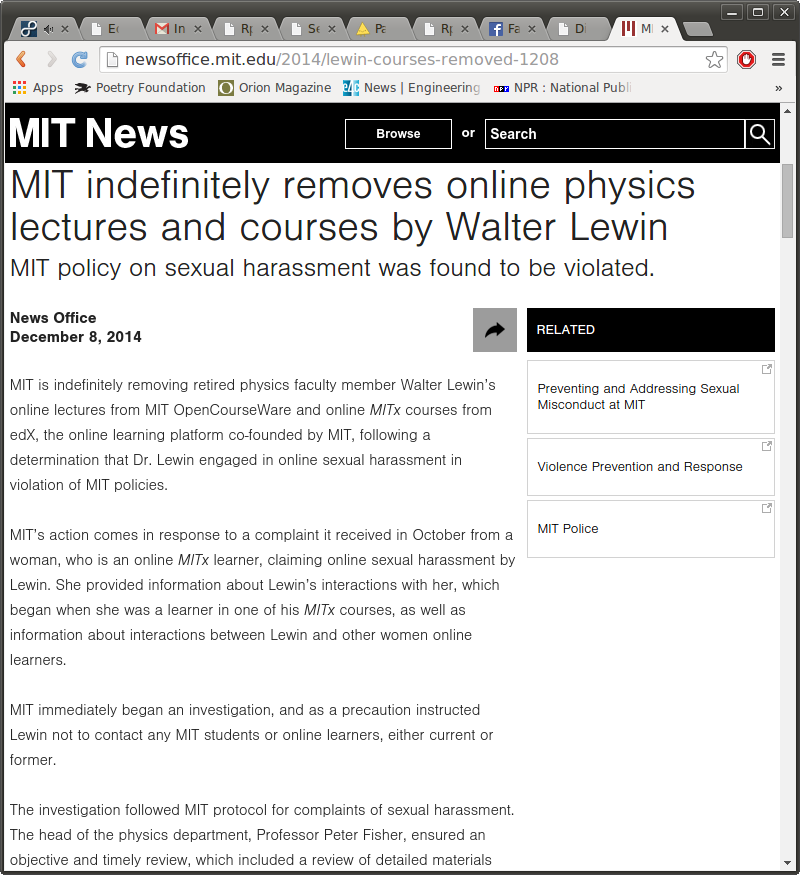
was depressing:
http://tech.mit.edu/V134/N60/walterlewin.html?comments#comments
Thankfully, talk on my hall’s mailing list was much more reasonable, and I’m re-posting here to reassure my non-putzen friends that there are serious non-acrimonious discussions happening about this. The discussion is at the bottom of this post (I’ve anonymized all except opt-ins).
Additionally, I really liked this Medium article, which I will summarize as “more teaching styles = more happy students, if we assume different students have different resonant frequencies.”
https://medium.com/@uberpreeya/walter-lewin-the-art-of-teaching-and-physics-gender-problem-9ebe5ea3adc0
“So many physicists are able to look at the result of the system they’ve created and decide that it’s not about the system, but about innate ability, especially the same innate ability that they have — which means there’s no reason to even try getting anyone else up to speed.”
“I suspect, though I cannot prove, that as soon as you decide that performance in your field is due mostly to some kind of innate ability, you stop respecting diversity in many ways. You stop respecting diversity of thought, because you’ve just picked one learning style and decided that it’s the only one worth teaching to. And I suspect — although, again, I cannot prove — that you stop respecting diversity of gender or race. After all, if success is all about some kind of innate ability, then there must be some reason why everyone who exhibits it looks the same.”
Discussion
A)
I understand and support removing him from teaching online courses, and even removing his emeritus status as a response to his inappropriate conduct. And for the record, I identify as a feminist. However, I’m not sure how I feel about removing the physics lectures from OCW. I don’t know that taking down lectures from 20 years ago that (presumably) have nothing to do with what he has been accused and found guilty of in 2013-2014 is really an appropriate or even meaningful response. To me, it seems kind of like burning Hemingway’s books because he was an alcoholic and a serial cheater–or, to use a more current example, burning Orson Scott Card’s books because of his strong opposition to same-sex marriage and homosexuality. Many people, including me, strongly disagree with Card’s personal views, and I am sure that at least some people disagree strongly enough to prevent them from reading or purchasing his books. However, even if Card’s personal views are strong enough to deter me from consuming his literature, that doesn’t mean that his works should be removed from society, and that no one should be able to read them. Similarly, I completely understand why ___ and others might feel uncomfortable watching the Lewin lectures now–however, I don’t think that means they should disappear completely. Perhaps MIT no longer wants to host them on OCW–if this is the case, I hope that they turn up on YouTube or somewhere else where they are free for public consumption. The good does not wash out the bad, nor the bad the good.
Additionally, if anyone has read the Tech article (http://tech.mit.edu/V134/N60/walterlewin.html) and the comments on it, I think this decision has warped the discourse around this issue. Many of the comments on the Tech are either “you damn millennials are too sensitive, back in my day women just kept their mouths shut when people complimented their attractiveness” or “stupid feminists are ruining the universe for everyone”. It’s incredibly frustrating that practically every article like this devolves into these sentiments, and I can’t help but think the removal of his old lectures detracts from the real issues at hand.
Why do I ever read the comments,
B)
Yes, everything A said!
I have enjoyed Orson Scott Card books, but once I found out about his views I decided to stop buying any. If I wanted to read them now I’d just get them from the library.
Some of those comments on the Tech article are aggravating (ugh, if some online prof called me “honey” or commented on my appearance, it would still be gross and inappropriate even if that was the extent of it), but pulling those videos hurts a lot of people a lot more than it hurts Lewin. It makes him look like a martyr and distracts from his actions that started all of it. At the same time it deprives everyone who wants to use them to learn. My high school friends and I watched some while preparing for the AP exam, and if I were to relearn some physics that’s where I’d want to go. Not to mention all the people who are teaching themselves physics around the world, especially if they wouldn’t otherwise have access to that kind of education.
C) Katie Bartel
MIT’s pulling the videos from OCW, but that doesn’t mean the lectures will cease to exist.
I assume someone will host the videos independently of MIT, and the material will still be available to students who search for it. It just won’t be provided by MIT.
I think it’s pretty reasonable for a school to refuse to promote content created by professor who violates the school’s code of conduct. As long as MIT doesn’t actively stop third party sites from hosting his lectures, I don’t think MIT is actively harming the lives of young physicists who want to use Lewin’s material to learn.
D)
1) how would anyone who is not MIT OCW or the dept of physics get access to these videos?
2) isn’t this serious copyright infringement?
E)
This. His videos are still up on the OCW youtube. I’m sure thousands of copies have already been made and will be posted, so this is less like burning Orson Scott Card’s books and more like his publisher saying that they find his views repulsive and no longer wish to be affiliated with him.
I haven’t watched many of Lewin’s lectures, and while the ones I did see were very good, I don’t remember them being god’s gift to people studying wave mechanics– they were just better than my instructor at the time. I think it’s reasonable to assume the MIT’s going to replace his lectures with videos that might not be quite as wonderful but will still be pretty damn great; there are other decent physics professors teaching at MIT.
Also, I think Lewin is the public face of MIT to much of the general public, and no matter what else was done/if he was stripped of his emeritus professorship/he was punished in some other way, he would continue to be the public face of MIT so long as his videos were on OCW. If they didn’t take his videos down, the school would seriously damage its credibility when it came to sexual harassment and assault by making the statement that the relative value of Lewin’s videos compared to whatever replaces them is more important than addressing what has to be serious misconduct. Peter Fisher and the other admins aren’t idiots (or Rolling Stone writers)– they knew what sort of backlash this would cause, and as such must have concrete evidence of ugly crap on Lewin’s part.
F)
Yeah, I’m not at all sure how this works. If the lectures are made available independently of MIT/OCW, then I don’t have a huge problem with their decision. I just hope that they will provide the videos/not go after anyone who does make them available on a third-party site. What would make me sad is if MIT takes the videos down and prevents them from being available at all.
Again, I am glad that they’re taking this seriously and that they’ve acknowledged Lewin’s misconduct publicly. I support their decisions to remove him from edX and as an emeritus professor (which I think is a pretty big deal). I don’t oppose their decision to remove the lectures from an MIT hosted and maintained, provided they are still out there somewhere (and freely available, ideally). What I don’t like is the idea of Lewin’s positive contributions disappearing into the ether. I hope that they will not. It is possible (and important) to separate a person’s artistic/literary/scientific/political contributions from their personal lives.
G)
even if he did something particularly egregious i don’t see this punishment fitting the crime as A said (her and i talked about this at length last night and agreed on that point). they could have disciplined him severely, but internally, and no one would ever know. or they could even just relieve him of teaching duties and leave the videos up. “lewin not teaching anymore” is a very different headline from “lewin permanently erased from the internet”.
H) Katie Bartel
Again, he isn’t being erased from the internet. His lectures are already available outside of the MIT OCW site.
Also, OCW lectures are released under this Creative Commons license. So I don’t even think MIT has grounds to sue for copyright infringement if someone “redistributes” the material.
I)
So it looks like all the OCW stuff is under a Creative Commons license, which I believe means that other people posting the videos to youtube is kosher (so long as it’s clearly attributed to MIT, ironically). I’m curious as to whether MIT made the decision to take down his videos with that in mind or if the administration was okay with taking his videos offline permanently.
J)
Assuming Lewin did something “very bad” — whatever that is…
People get hurt… all the time… by others who happen to have power over them at MIT.
It’s important to send a message that MIT will go full nuclear on you — no matter who you are.
I would hate to be on the pulling end of this trigger — but I have to say I feel pretty OK with this outcome.
+1 Katie — everything is CC-ND … you can host it yourself.
K)
as dumb as mit is, mit’s not dumb. they certainly know what the copyright status of anything they’ve ever produced is (and thank you and katie for pointing out that these lectures are CC). so honestly, they probably did consider that this punishment seems really harsh, but if you consider that all the material will still be out there and free anyway, then it’s more of just a distancing of mit from lewin. i think in that light, you can see how peter fisher et al decided that this would be an acceptable punishment.
L)
It seems like MIT is not interested in “wiping him from the internet,” but just in disaffiliating from him. Also, in this day in age… I feel like nothing is available in just one place, and there are many other places on the internet you could find his lectures.
The institute’s response seems pretty reasonable to me.
Also, why did I just read the comments on the Tech article. Now I just want to die.
M)
I think you’re not giving MIT and the office of digital learning enough credit. I feel like it’s basically impossible that they haven’t considered this and are aware that the videos are mirrored and reposted all over the internet.
I agree with pretty much everything Katie has said. I think this is MIT saying that they do not want to be affiliated with Lewin and don’t want him to be the face of their online education initiatives, which in no way is the same as removing him completely from the internet or trying to erase his existence.
N)
Re: Also, why did I just read the comments on the Tech article. Now I just want to die.
Classic blunder.
O)
Fair enough, as long as they’re out there somewhere, I’m think I’m satisfied? I guess I thought that MIT could sort of remove them forever. But it seems like I am clearly wrong. (And I agree, I don’t think the Lewin lectures are the greatest thing since cheesy snacks, but I do know lots of non-MIT people who do).
___, that’s a really good point about him being the public face of MIT to the general public. I hadn’t considered that. And taking that into account, this decision does make more sense. And I am in no way trying to imply that Peter Fisher et al are overreacting–they seem to have taken this very seriously, and I am glad that they have. My concern was that perhaps they were…reacting sort of orthogonally? I don’t know if I’m making sense here.
I sincerely thank you for the thoughtful discourse on this topic, Putz. You’ve raised some good points, and have caused me to seriously re-evaluate my initial reaction. Let’s hope that MIT will set a good example for universities, and will continue take sexual assault seriously across the board.
P)
Yeah, my thing about Peter Fisher not being an idiot is less for putz and more for idiots on facebook/in real life.
Q)
I want to echo A’s entire thought process, from 90% of her original points to her gratitude for the facts and opinions expressed in this thread. I still have a streak of hostility in my reaction to this, but it’s much, much weaker than it had been.
R)
Yeah, MIT themselves added Lewin’s lecture videos to archive.org a couple years ago, so I assume that the office of digital learning made the takedown decision in part based on the knowledge that MIT had already set up a mirror of his videos. They’re permanently archived on a site that is not hosted by MIT and does not give the impression that MIT continues to endorse Lewin’s work, which I think is a very reasonable solution.
I also agree with what Katie said. And I did read one good comment, in all of the Internet frothing about this, which pointed out that MIT can’t do a whole lot to punish a retired professor. Removing him from teaching the EdX classes in which the harassment happened is an obvious and necessary step, but stripping him of his emeritus title and declining to host his lecture videos affects his legacy as an MIT professor — which is about the only thing MIT has any leverage over. From what I’ve heard about his ego and his pride in the OCW videos, this punishment is hitting him where it hurts.
(Also, they definitely could have disciplined him internally and taken down his EdX course. But if you read his Twitter, people — and by people I mean “female students” — contact him with questions about his OCW lecture videos, and he gives them his email address. The lecture videos being online at all means that he has an avenue to contact students, and I can see why MIT would be leery of being the hosting service for those lecture videos.)
S)
i just had a pretty good conversation about this with my aunt (who’s been a course 12 prof since like the 80s?), and she seems to respect MIT’s actions on this because MIT does not have a particularly great track record of dealing with issues of sexism and thinks this is a solid stance for them to be taking now. i think not enough people are thinking about this from the perspective of what it can be like to be a woman in academia who is harassed by a person in a position of power, and how often these things are swept under the rug with the attitude of “well, he’s too famous/important/prominent to be punished”. i think we will probably never know the extent of what lewin did, and it’s not fair for us to be making these judgment calls without knowing all the details. i think not enough people are thinking about this from the perspective of being the victim of this sexual harassment (which may be impossible to really do, if you have never experienced it), and i think it’s noteworthy that the physics department, the office of digital learning, the MIT administration, and a lot of people who have experienced sexism and/or harassment at MIT all seem to have come to the conclusion that this is the right thing to do. like, they stripped him of his professor emeritus title! that’s ridiculously huge.
i’m honestly pretty proud of MIT for this gesture, and i agree with __ on the message that this is sending about how MIT is not willing to tolerate sexual misconduct from anyone.
A)
More great points from R/S, thank you guys so much! And yes, removing the emeritus title is a big deal, and I’m glad they did that. That was not mentioned in the first article I read about this.
Not to hijack the thread, but it’s interesting/disappointing to hear that MIT still doesn’t have a great track record with this stuff (I’m thinking more from the sides involving faculty, staff, graduate students, administrators…we know they are not good when it comes to student issues, at least those involving undergraduates and harassment/assault). I have been under the impression that the 1999 study was a pretty big deal, and I had hoped that they would have made some positive progress since then. It would be fascinating to see an update 15-20 years later–has anything changed? I think MIT admissions does do a good job in terms of encouraging female students to apply as undergraduates (and hopefully students of all ethnic and racial backgrounds, from all income levels, and of any sexual or gender orientation), and they seem to lead the way among technical schools, as far as I know. They should strive to lead the way in academia and research as well.
T) Nancy Ouyang
http://web.mit.edu/fnl/women/women.html this 1999 study i assume?
i believe MIT is taking steps on this issue (of researchers being protected financially / career wise if they report their superior). i attended some brainstorming session after that grad student wrote an anonymous piece in the tech, which had a lot of good discussion and hopefully has been translated in to actions (does anyone know more about this?)
i actually think of harvey mudd when i think of universities leading the way
http://www.npr.org/blogs/alltechconsidered/2013/05/01/178810710/How-One-College-Is-Closing-The-Tech-Gender-Gap
because, well, see mit’s gender ratios by course:
http://orangenarwhals.blogspot.com/2011/12/datasourceurldocs.html (2011, take with grain of salt)
the 2008 statistics
http://tech.mit.edu/V128/PDF/V128-N47.pdf (2008, pg 11)
